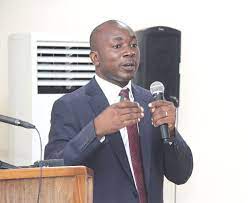Economist and Finance Lecturer, Professor Godfred Bokpin has stated that banks operating in Ghana have rejected the original terms of the debt exchange programme.
According to him, the banks have made counter-proposal to government that analyses the impact of the proposed debt exchange on their balanced sheet.
Speaking on the Joy FM Super Morning Show, Professor Bokpin, said, the banks have indicated that even without debt restructuring, the mark-to-market policy is manifesting explicit losses on their books.
“The banks practically have rejected the original terms of the debt exchange. We are told that they have made a counter-proposal that analyses the impact of the proposed debt exchange on their balanced sheet. The banks have indicated that even without debt restructuring, mark-to-market of government financial instrument on their books is manifesting explicitly in losses”.
The banks according to the Central Securities Depository Monthly Bulletin hold chunk of government bonds to the tune of about ¢50 billion.
The University of Ghana Business School Associate Professor also said the 3% cut in the Capital Adequacy Ratio will not be enough to cushion the banks against shocks.
“We have seen and as we have indicated that the Bank of Ghana probably would cut 3% of the capital stabilization buffer essentially reducing the Capital Adequacy Ratio to 10% in order to accommodate them but that would still not been enough”.
“So there is already a push back from the bank, while it is good news to organised labour what happened yesterday [December 22, 2022], it makes the road a little harder for government in our journey to restore debt sustainability”.
Continuing, Professor Bokpin said the three years to restore debt sustainability is not enough because of the financial difficulties the country faces.
“So what It means is that debt sustainability is actually beyond an IMF programme now because we are told that the IMF programme is a three-year extended credit facility. Assuming it kicks in 2023, it would end in 2026 practically”.
Latest Stories
-
WAFU B U-17 Girls’ Cup: Black Maidens beat Nigeria on penalties to win inaugral tournament
7 minutes -
Real Madrid beat Sevilla to keep pressure on leaders Atletico
1 hour -
Liverpool put six past Spurs to go four points clear
1 hour -
Manchester United lose 3-0 at home to Bournemouth yet again
1 hour -
CHAN 2024Q: ‘It’s still an open game’ – Didi on Ghana’s draw with Nigeria
1 hour -
CHAN 2024Q: Ghana’s Black Galaxies held by Nigeria in first-leg tie
2 hours -
Dr Nduom hopeful defunct GN bank will be restored under Mahama administration
3 hours -
Bridget Bonnie celebrates NDC Victory, champions hope for women and youth
3 hours -
Shamima Muslim urges youth to lead Ghana’s renewal at 18Plus4NDC anniversary
4 hours -
Akufo-Addo condemns post-election violence, blames NDC
4 hours -
DAMC, Free Food Company, to distribute 10,000 packs of food to street kids
5 hours -
Kwame Boafo Akuffo: Court ruling on re-collation flawed
6 hours -
Samuel Yaw Adusei: The strategist behind NDC’s electoral security in Ashanti region
6 hours -
I’m confident posterity will judge my performance well – Akufo-Addo
6 hours -
Syria’s minorities seek security as country charts new future
7 hours

